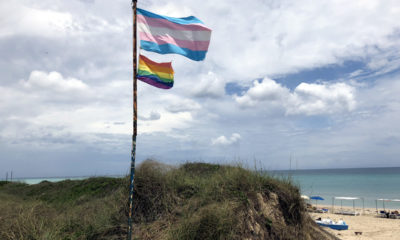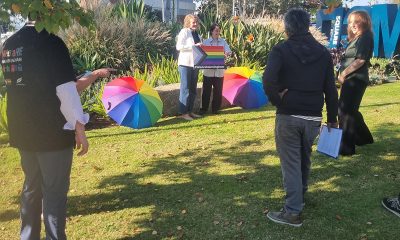homepage news
A Cuban couple’s ‘great gay odyssey’
Yasmany Sánchez Pérez and Diosbel Alvarez fled persecution
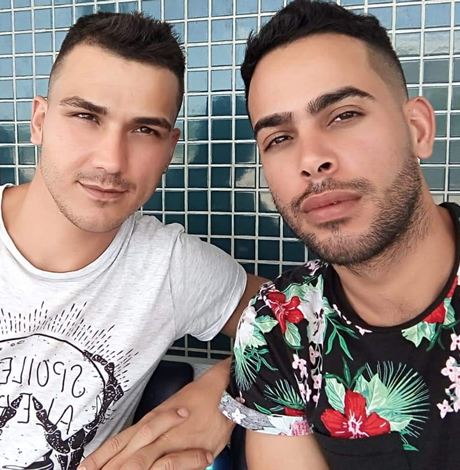
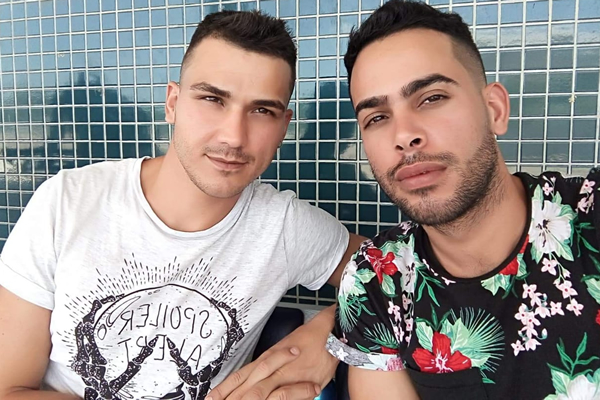
Yasmany Sánchez Pérez had an awakening when he read “Before Night Falls”, the autobiography of Reynaldo Arenas, a gay Cuban writer condemned by the country’s dictatorship because of his sexual orientation and political opposition. His way of seeing the reality that surrounded him completely changed and he saw his life portrayed in the pages of that book the regime banned. Sánchez, like Arenas, has been persecuted and harassed by Castroism’s homophobic minions.
Although they are separated by 50 years of history, this chronic intolerance on the part of the Cuban regime against those who raise their voices in defense of the rights denied to them as human beings prevails.
Sánchez, 28, made himself heard on May 11, 2019, when he joined a Havana march that independent LGBTQ activists organized in response to the National Center for Sexual Education’s decision to cancel their annual march in the Cuban capital that commemorates the International Day Against Homophobia, Transphobia and Biphobia.
CENESEX, which Mariela Castro, daughter of former President Raúl Castro, directs, spearheads government-sanctioned LGBTQ activism in Cuba. The decision to cancel their IDAHOBiT march in Havana prompted hundreds of Cubans to participate in the independent event, which the regime interpreted as an act of political dissent.
The march, organized through social media, took place less than three months after Cubans ratified their country’s new constitution.
A previous draft contained Article 68, which would have opened the door to marriage for same-sex couples in Cuba, but the National Assembly removed it in response to pressure that various religious denominations put on the government and reported opposition from the Cuban people. The National Assembly instead said a referendum on reforms to the country’s Family Code will take place within two years.
“That cancellation was the last straw,” said Sánchez during an interview with the Washington Blade from French Guiana, a French territory on the northern coast of South America. “In the past they have imposed everything on the Cuban people. They could and should incorporate gay rights, as they have done with everything in Cuba, without the need for a consultation. That is why I joined the protests. And although I was afraid, my desire for justice was greater. I went and was there. I don’t regret it and I never will. It was my duty to do my bit.”
The Cuban government prohibits unauthorized demonstrations, and those who publicly criticize it face arrest and even criminal charges.
The May 11, 2019, march took place along several busy streets near the Cuban Capitol. Police officers and state security agents infiltrated the protesters.
“At that time, I felt that I was free and that the world was listening to me and, above all, that my country was being a little freer,” Sánchez recalled. “At the end of Paseo del Prado, the march was stopped by the forces of repression.”
Sánchez began to encourage the rest of the crowd to continue marching when he felt a violent force drag him down to the ground.
“They are taking me prisoner, they are taking me prisoner,” he shouted as a state security agent tried to separate him from the crowd.
“Many people jumped in to stop that injustice, only Ariel Ruíz Urquiola (a well-known gay activist and opposition figure) and the repressors who joined in remained glued to my body. We were both led into a white police car. One of those men, when I resisted entering the patrol car, told me, ‘Bring your arm in because I am going to break it with the door.’”
Sánchez, along with Urquiola and other march participants, were taken to a police station and placed into holding cells. Sánchez was released after a number of agents interrogated him for several hours and accused him of disturbing public order.
The agents tried to get him to sign a confession, but he refused.
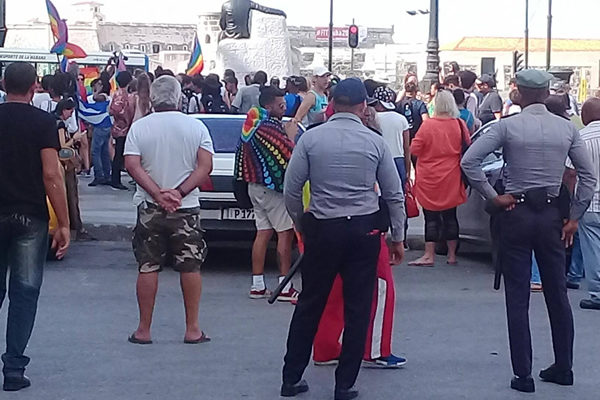
The witch hunt begins
That incident was only the beginning of what Sánchez describes as a “witch hunt” against him, his partner, his family and friends. Agents with Cuba’s National Revolutionary Police five days after Sánchez’s detention in Havana began to question his friends and placed his mother’s house in Quivicán, a town in Mayabeque province, under surveillance.
State security agents stopped him when he left and took him to a police station where he underwent a second interrogation.
“They told me about my life with all the details: Where I worked, where I had worked, where I studied. Everything,” Sánchez said. “They told me about my condition. They said it was not convenient for me to be involved in politics, much less interact with opposition figures, because I am a person with HIV/AIDS. They asked me why I had participated in the march. Everything was in an authoritarian and threatening tone.”
Sánchez in early June 2019 went to Ruíz’s farm. The two men met at the Havana march and had become friends. Sánchez stayed with Ruíz for approximately two weeks, and the police summoned him for another interrogation after he returned home.
“They tried to find information about him. They asked what kind of relationship I had with Ariel,” Sánchez said. “I refused to answer. One of the officers spoke to me in a threatening tone and banged on the table. I remember him telling me that Ariel was a counterrevolutionary and that relating to him also made me the same. And for that reason he could go to prison.”
The police eventually released Sánchez, but not before they threatened and intimidated him and warned him they would closely follow him.
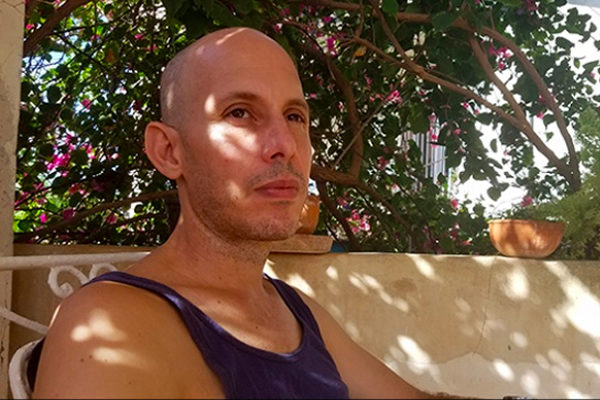
Sánchez received antiretroviral drugs under a program that Cuba’s national health care system runs, but he said he did not get his entire monthly supply when he went to pick it up in July 2019. Sánchez made several inquiries, and was finally told a national shortage in HIV medications was the likely reason he did not receive his full regimen.
Sánchez reached out to a friend who also receives antiretroviral drugs through the same program, and he assured him that he had received all of his medications. Sánchez said he began to suspect this “missing person” was another tactic the regime used to punish him for his “rebellion.”
“After that, one of my HIV medications was missing in September and October. I knew it was its way of punishing me,” he said. “I have been an HIV patient since 2011 and since I started my treatment I have never been short. It is a simple therapy manufactured in Cuba.”
Sánchez said the owner of the house in which he lived with his partner, Diosbel Alvarez, in Havana told him that he should move because the government had decided to persecute him.
“She was aware of my political problems and I had to leave the house,” said Sánchez. “I automatically knew that she had been called or threatened, because nobody is removed because of simple comments. We realized at that moment that there were people watching outside the house.”
He said an unexpected visitor arrived at his new home shortly after he moved in. It was a state security agent who came to confirm the control the regime maintained over his life.
The agent tried to discourage Alvarez from having relationships with opposition figures inside and outside of Cuba. The agent also threatened to “deport” him to his native province because he was living illegally in Havana. (Authorities require a person who lives in Havana to have an address in the Cuban capital on their identity document.)
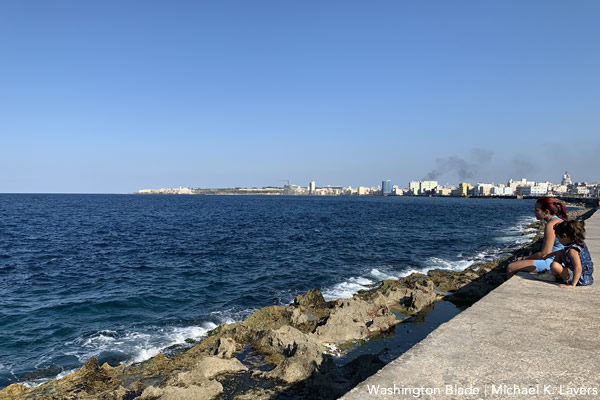
For Alvarez, Sánchez’s partner for more than a year and a half, the whole situation helped him become aware of the oppressive system into which he was born.
“Simply by trying to achieve equal rights and by openly demanding from the government that our social guarantees be respected, we were, and myself included, since I suffered it with him, condemned to social exile,” said Alvarez.
They were also kicked out of that house and the owner of the hostel where Sánchez worked fired him a short time later because of the regime’s pressure.
“She (the owner of the hostel) felt that she was being watched and a security officer told her that it was not convenient to have me working there,” Sánchez said. “She agreed with my way of thinking, but she was very afraid that her business would be closed.”
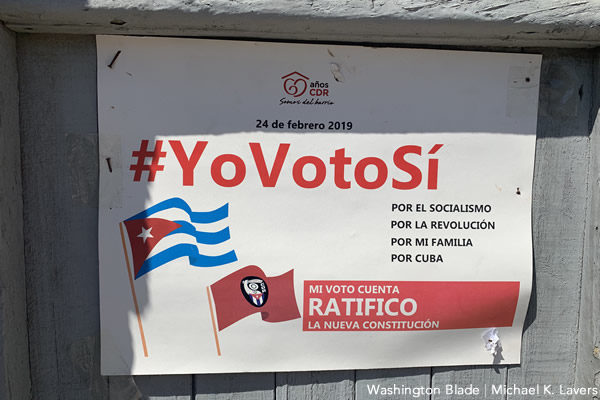
Sánchez and Alvarez decided that fleeing the country was the only way to stop the voracious siege under which they had lived since the march. They left Cuba for Suriname, a country that borders French Guiana, on Nov. 20, 2019.
Cubans do not need a visa to travel to Suriname.
“For me, having to abandon my country was like uprooting a tree by the roots and trying to plant it somewhere else,” Alvarez pointed out. “Leaving family and friends behind, even knowing that there is a chance of never meeting again, is a feeling that really has no explanation.
Sánchez and Alvarez lived in Suriname for approximately four months, but they decided to travel to Uruguay when they learned the country does not grant political asylum to Cubans. Immigration officials and police in neighboring Guyana robbed and threatened Sánchez and Alvarez after they crossed the border from Suriname. They traveled across Brazil and arrived in Uruguay on March 8.
Sánchez and Alvarez then asked for asylum.
“We got in touch with an association that helps people with HIV/AIDS called ASEPO, which helped my partner with his medications,” Alvarez said. “In my case, I was tested for HIV and I tested positive. They also helped me with medications to treat the disease and psychological help.”
Sánchez and Alvarez soon learned that although Uruguay provides assistance to refugees, the country does not guarantee it will grant these requests.
“In the end, years would go by under this process and that status would never be recognized,” lamented Alvarez. “Even if it were possible, it would be of no use to us, since we would never be nationalized in the country.”
With a second door closed, both decided to retrace their steps across South America and travel to French Guiana. Sánchez and Alvarez arrived in the French territory on Aug. 30.
“This is an overseas territory of France. One thinks of this country and automatically believes that it is the same as its European metropolis, but in reality that is far from it,” said Sánchez. “Although the laws and rights are the same, it is a big problem to access them.”
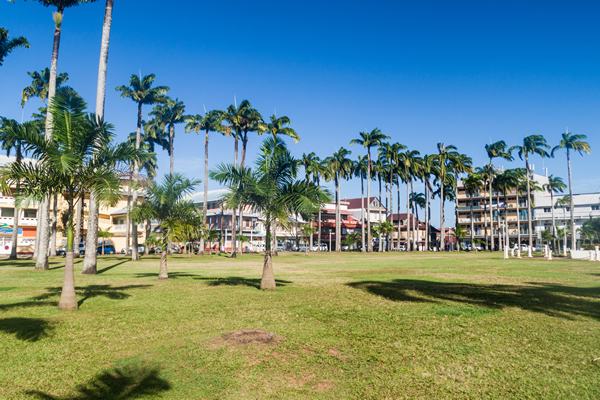
Sánchez and Alvarez found themselves sleeping on the street without food for four days until the French Red Cross provided them with a place to stay during their asylum process. The few LGBTQ organizations that are in French Guiana did not provide any assistance to them. Sánchez and Alvarez filed their asylum petition claim without the help of a lawyer.
“Unfortunately, the deadline to present our case to the responsible body, the French Office for the Protection of Refugees and Stateless Persons (OFPRA), was very short,” Alvarez explained. “Language was largely a barrier to truly expressing our story. Our request for asylum was unfairly denied because we supposedly lacked arguments and evidence to corroborate what we experienced in Cuba, despite the fact that we presented a lot of evidence.”
They are currently appealing the OFPRA’s decision to France’s National Court of Asylum Law (CNDA).
“Many people are of the opinion that the probability of being accepted and that the CNDA changes the OFPRA’s decision is low,” said Sánchez.
That uncertainty or any of the obstacles, discrimination or abuse this young couple has had to face has not stopped their search for freedom and their longing for a better future.
“We have lived the great gay odyssey,” says Sánchez. “There have been days of stress, hunger, no sleep, wanting to cry, but we don’t get tired of dreaming of finishing our training as professionals; of being citizens of some place that values its children; of being respected, of leaving discrimination behind, and above all, the stigma of having been born in a country run by corruption and indoctrination.”
homepage news
Honoring the legacy of New Orleans’ 1973 UpStairs Lounge fire
Why the arson attack that killed 32 gay men still resonates 50 years later

On June 23 of last year, I held the microphone as a gay man in the New Orleans City Council Chamber and related a lost piece of queer history to the seven council members. I told this story to disabuse all New Orleanians of the notion that silence and accommodation, in the face of institutional and official failures, are a path to healing.
The story I related to them began on a typical Sunday night at a second-story bar on the fringe of New Orleans’ French Quarter in 1973, where working-class men would gather around a white baby grand piano and belt out the lyrics to a song that was the anthem of their hidden community, “United We Stand” by the Brotherhood of Man.
“United we stand,” the men would sing together, “divided we fall” — the words epitomizing the ethos of their beloved UpStairs Lounge bar, an egalitarian free space that served as a forerunner to today’s queer safe havens.
Around that piano in the 1970s Deep South, gays and lesbians, white and Black queens, Christians and non-Christians, and even early gender minorities could cast aside the racism, sexism, and homophobia of the times to find acceptance and companionship for a moment.
For regulars, the UpStairs Lounge was a miracle, a small pocket of acceptance in a broader world where their very identities were illegal.
On the Sunday night of June 24, 1973, their voices were silenced in a murderous act of arson that claimed 32 lives and still stands as the deadliest fire in New Orleans history — and the worst mass killing of gays in 20th century America.
As 13 fire companies struggled to douse the inferno, police refused to question the chief suspect, even though gay witnesses identified and brought the soot-covered man to officers idly standing by. This suspect, an internally conflicted gay-for-pay sex worker named Rodger Dale Nunez, had been ejected from the UpStairs Lounge screaming the word “burn” minutes before, but New Orleans police rebuffed the testimony of fire survivors on the street and allowed Nunez to disappear.
As the fire raged, police denigrated the deceased to reporters on the street: “Some thieves hung out there, and you know this was a queer bar.”
For days afterward, the carnage met with official silence. With no local gay political leaders willing to step forward, national Gay Liberation-era figures like Rev. Troy Perry of the Metropolitan Community Church flew in to “help our bereaved brothers and sisters” — and shatter officialdom’s code of silence.
Perry broke local taboos by holding a press conference as an openly gay man. “It’s high time that you people, in New Orleans, Louisiana, got the message and joined the rest of the Union,” Perry said.
Two days later, on June 26, 1973, as families hesitated to step forward to identify their kin in the morgue, UpStairs Lounge owner Phil Esteve stood in his badly charred bar, the air still foul with death. He rebuffed attempts by Perry to turn the fire into a call for visibility and progress for homosexuals.
“This fire had very little to do with the gay movement or with anything gay,” Esteve told a reporter from The Philadelphia Inquirer. “I do not want my bar or this tragedy to be used to further any of their causes.”
Conspicuously, no photos of Esteve appeared in coverage of the UpStairs Lounge fire or its aftermath — and the bar owner also remained silent as he witnessed police looting the ashes of his business.
“Phil said the cash register, juke box, cigarette machine and some wallets had money removed,” recounted Esteve’s friend Bob McAnear, a former U.S. Customs officer. “Phil wouldn’t report it because, if he did, police would never allow him to operate a bar in New Orleans again.”
The next day, gay bar owners, incensed at declining gay bar traffic amid an atmosphere of anxiety, confronted Perry at a clandestine meeting. “How dare you hold your damn news conferences!” one business owner shouted.
Ignoring calls for gay self-censorship, Perry held a 250-person memorial for the fire victims the following Sunday, July 1, culminating in mourners defiantly marching out the front door of a French Quarter church into waiting news cameras. “Reverend Troy Perry awoke several sleeping giants, me being one of them,” recalled Charlene Schneider, a lesbian activist who walked out of that front door with Perry.

Esteve doubted the UpStairs Lounge story’s capacity to rouse gay political fervor. As the coroner buried four of his former patrons anonymously on the edge of town, Esteve quietly collected at least $25,000 in fire insurance proceeds. Less than a year later, he used the money to open another gay bar called the Post Office, where patrons of the UpStairs Lounge — some with visible burn scars — gathered but were discouraged from singing “United We Stand.”
New Orleans cops neglected to question the chief arson suspect and closed the investigation without answers in late August 1973. Gay elites in the city’s power structure began gaslighting the mourners who marched with Perry into the news cameras, casting suspicion on their memories and re-characterizing their moment of liberation as a stunt.
When a local gay journalist asked in April 1977, “Where are the gay activists in New Orleans?,” Esteve responded that there were none, because none were needed. “We don’t feel we’re discriminated against,” Esteve said. “New Orleans gays are different from gays anywhere else… Perhaps there is some correlation between the amount of gay activism in other cities and the degree of police harassment.”

An attitude of nihilism and disavowal descended upon the memory of the UpStairs Lounge victims, goaded by Esteve and fellow gay entrepreneurs who earned their keep via gay patrons drowning their sorrows each night instead of protesting the injustices that kept them drinking.
Into the 1980s, the story of the UpStairs Lounge all but vanished from conversation — with the exception of a few sanctuaries for gay political debate such as the local lesbian bar Charlene’s, run by the activist Charlene Schneider.
By 1988, the 15th anniversary of the fire, the UpStairs Lounge narrative comprised little more than a call for better fire codes and indoor sprinklers. UpStairs Lounge survivor Stewart Butler summed it up: “A tragedy that, as far as I know, no good came of.”
Finally, in 1991, at Stewart Butler and Charlene Schneider’s nudging, the UpStairs Lounge story became aligned with the crusade of liberated gays and lesbians seeking equal rights in Louisiana. The halls of power responded with intermittent progress. The New Orleans City Council, horrified by the story but not yet ready to take its look in the mirror, enacted an anti-discrimination ordinance protecting gays and lesbians in housing, employment, and public accommodations that Dec. 12 — more than 18 years after the fire.
“I believe the fire was the catalyst for the anger to bring us all to the table,” Schneider told The Times-Picayune, a tacit rebuke to Esteve’s strategy of silent accommodation. Even Esteve seemed to change his stance with time, granting a full interview with the first UpStairs Lounge scholar Johnny Townsend sometime around 1989.
Most of the figures in this historic tale are now deceased. What’s left is an enduring story that refused to go gently. The story now echoes around the world — a musical about the UpStairs Lounge fire recently played in Tokyo, translating the gay underworld of the 1973 French Quarter for Japanese audiences.
When I finished my presentation to the City Council last June, I looked up to see the seven council members in tears. Unanimously, they approved a resolution acknowledging the historic failures of city leaders in the wake of the UpStairs Lounge fire.
Council members personally apologized to UpStairs Lounge families and survivors seated in the chamber in a symbolic act that, though it could not bring back those who died, still mattered greatly to those whose pain had been denied, leaving them to grieve alone. At long last, official silence and indifference gave way to heartfelt words of healing.
The way Americans remember the past is an active, ongoing process. Our collective memory is malleable, but it matters because it speaks volumes about our maturity as a people, how we acknowledge the past’s influence in our lives, and how it shapes the examples we set for our youth. Do we grapple with difficult truths, or do we duck accountability by defaulting to nostalgia and bluster? Or worse, do we simply ignore the past until it fades into a black hole of ignorance and indifference?
I believe that a factual retelling of the UpStairs Lounge tragedy — and how, 50 years onward, it became known internationally — resonates beyond our current divides. It reminds queer and non-queer Americans that ignoring the past holds back the present, and that silence is no cure for what ails a participatory nation.
Silence isolates. Silence gaslights and shrouds. It preserves the power structures that scapegoat the disempowered.
Solidarity, on the other hand, unites. Solidarity illuminates a path forward together. Above all, solidarity transforms the downtrodden into a resounding chorus of citizens — in the spirit of voices who once gathered ‘round a white baby grand piano and sang, joyfully and loudly, “United We Stand.”

Robert W. Fieseler is a New Orleans-based journalist and the author of “Tinderbox: the Untold Story of the Up Stairs Lounge Fire and the Rise of Gay Liberation.”
homepage news
New Supreme Court term includes critical LGBTQ case with ‘terrifying’ consequences
Business owner seeks to decline services for same-sex weddings

The U.S. Supreme Court, after a decision overturning Roe v. Wade that still leaves many reeling, is starting a new term with justices slated to revisit the issue of LGBTQ rights.
In 303 Creative v. Elenis, the court will return to the issue of whether or not providers of custom-made goods can refuse service to LGBTQ customers on First Amendment grounds. In this case, the business owner is Lorie Smith, a website designer in Colorado who wants to opt out of providing her graphic design services for same-sex weddings despite the civil rights law in her state.
Jennifer Pizer, acting chief legal officer of Lambda Legal, said in an interview with the Blade, “it’s not too much to say an immeasurably huge amount is at stake” for LGBTQ people depending on the outcome of the case.
“This contrived idea that making custom goods, or offering a custom service, somehow tacitly conveys an endorsement of the person — if that were to be accepted, that would be a profound change in the law,” Pizer said. “And the stakes are very high because there are no practical, obvious, principled ways to limit that kind of an exception, and if the law isn’t clear in this regard, then the people who are at risk of experiencing discrimination have no security, no effective protection by having a non-discrimination laws, because at any moment, as one makes their way through the commercial marketplace, you don’t know whether a particular business person is going to refuse to serve you.”
The upcoming arguments and decision in the 303 Creative case mark a return to LGBTQ rights for the Supreme Court, which had no lawsuit to directly address the issue in its previous term, although many argued the Dobbs decision put LGBTQ rights in peril and threatened access to abortion for LGBTQ people.
And yet, the 303 Creative case is similar to other cases the Supreme Court has previously heard on the providers of services seeking the right to deny services based on First Amendment grounds, such as Masterpiece Cakeshop and Fulton v. City of Philadelphia. In both of those cases, however, the court issued narrow rulings on the facts of litigation, declining to issue sweeping rulings either upholding non-discrimination principles or First Amendment exemptions.
Pizer, who signed one of the friend-of-the-court briefs in opposition to 303 Creative, said the case is “similar in the goals” of the Masterpiece Cakeshop litigation on the basis they both seek exemptions to the same non-discrimination law that governs their business, the Colorado Anti-Discrimination Act, or CADA, and seek “to further the social and political argument that they should be free to refuse same-sex couples or LGBTQ people in particular.”
“So there’s the legal goal, and it connects to the social and political goals and in that sense, it’s the same as Masterpiece,” Pizer said. “And so there are multiple problems with it again, as a legal matter, but also as a social matter, because as with the religion argument, it flows from the idea that having something to do with us is endorsing us.”
One difference: the Masterpiece Cakeshop litigation stemmed from an act of refusal of service after owner, Jack Phillips, declined to make a custom-made wedding cake for a same-sex couple for their upcoming wedding. No act of discrimination in the past, however, is present in the 303 Creative case. The owner seeks to put on her website a disclaimer she won’t provide services for same-sex weddings, signaling an intent to discriminate against same-sex couples rather than having done so.
As such, expect issues of standing — whether or not either party is personally aggrieved and able bring to a lawsuit — to be hashed out in arguments as well as whether the litigation is ripe for review as justices consider the case. It’s not hard to see U.S. Chief Justice John Roberts, who has sought to lead the court to reach less sweeping decisions (sometimes successfully, and sometimes in the Dobbs case not successfully) to push for a decision along these lines.
Another key difference: The 303 Creative case hinges on the argument of freedom of speech as opposed to the two-fold argument of freedom of speech and freedom of religious exercise in the Masterpiece Cakeshop litigation. Although 303 Creative requested in its petition to the Supreme Court review of both issues of speech and religion, justices elected only to take up the issue of free speech in granting a writ of certiorari (or agreement to take up a case). Justices also declined to accept another question in the petition request of review of the 1990 precedent in Smith v. Employment Division, which concluded states can enforce neutral generally applicable laws on citizens with religious objections without violating the First Amendment.
Representing 303 Creative in the lawsuit is Alliance Defending Freedom, a law firm that has sought to undermine civil rights laws for LGBTQ people with litigation seeking exemptions based on the First Amendment, such as the Masterpiece Cakeshop case.
Kristen Waggoner, president of Alliance Defending Freedom, wrote in a Sept. 12 legal brief signed by her and other attorneys that a decision in favor of 303 Creative boils down to a clear-cut violation of the First Amendment.
“Colorado and the United States still contend that CADA only regulates sales transactions,” the brief says. “But their cases do not apply because they involve non-expressive activities: selling BBQ, firing employees, restricting school attendance, limiting club memberships, and providing room access. Colorado’s own cases agree that the government may not use public-accommodation laws to affect a commercial actor’s speech.”
Pizer, however, pushed back strongly on the idea a decision in favor of 303 Creative would be as focused as Alliance Defending Freedom purports it would be, arguing it could open the door to widespread discrimination against LGBTQ people.
“One way to put it is art tends to be in the eye of the beholder,” Pizer said. “Is something of a craft, or is it art? I feel like I’m channeling Lily Tomlin. Remember ‘soup and art’? We have had an understanding that whether something is beautiful or not is not the determining factor about whether something is protected as artistic expression. There’s a legal test that recognizes if this is speech, whose speech is it, whose message is it? Would anyone who was hearing the speech or seeing the message understand it to be the message of the customer or of the merchants or craftsmen or business person?”
Despite the implications in the case for LGBTQ rights, 303 Creative may have supporters among LGBTQ people who consider themselves proponents of free speech.
One joint friend-of-the-court brief before the Supreme Court, written by Dale Carpenter, a law professor at Southern Methodist University who’s written in favor of LGBTQ rights, and Eugene Volokh, a First Amendment legal scholar at the University of California, Los Angeles, argues the case is an opportunity to affirm the First Amendment applies to goods and services that are uniquely expressive.
“Distinguishing expressive from non-expressive products in some contexts might be hard, but the Tenth Circuit agreed that Smith’s product does not present a hard case,” the brief says. “Yet that court (and Colorado) declined to recognize any exemption for products constituting speech. The Tenth Circuit has effectively recognized a state interest in subjecting the creation of speech itself to antidiscrimination laws.”
Oral arguments in the case aren’t yet set, but may be announced soon. Set to defend the state of Colorado and enforcement of its non-discrimination law in the case is Colorado Solicitor General Eric Reuel Olson. Just this week, the U.S. Supreme Court announced it would grant the request to the U.S. solicitor general to present arguments before the justices on behalf of the Biden administration.
With a 6-3 conservative majority on the court that has recently scrapped the super-precedent guaranteeing the right to abortion, supporters of LGBTQ rights may think the outcome of the case is all but lost, especially amid widespread fears same-sex marriage would be next on the chopping block. After the U.S. Tenth Circuit Court of Appeals ruled against 303 Creative in the lawsuit, the simple action by the Supreme Court to grant review in the lawsuit suggests they are primed to issue a reversal and rule in favor of the company.
Pizer, acknowledging the call to action issued by LGBTQ groups in the aftermath of the Dobbs decision, conceded the current Supreme Court issuing the ruling in this case is “a terrifying prospect,” but cautioned the issue isn’t so much the makeup of the court but whether or not justices will continue down the path of abolishing case law.
“I think the question that we’re facing with respect to all of the cases or at least many of the cases that are in front of the court right now, is whether this court is going to continue on this radical sort of wrecking ball to the edifice of settled law and seemingly a goal of setting up whole new structures of what our basic legal principles are going to be. Are we going to have another term of that?” Pizer said. “And if so, that’s terrifying.”
homepage news
Kelley Robinson, a Black, queer woman, named president of Human Rights Campaign
Progressive activist a veteran of Planned Parenthood Action Fund

Kelley Robinson, a Black, queer woman and veteran of Planned Parenthood Action Fund, is to become the next president of the Human Rights Campaign, the nation’s leading LGBTQ group announced on Tuesday.
Robinson is set to become the ninth president of the Human Rights Campaign after having served as executive director of Planned Parenthood Action Fund and more than 12 years of experience as a leader in the progressive movement. She’ll be the first Black, queer woman to serve in that role.
“I’m honored and ready to lead HRC — and our more than three million member-advocates — as we continue working to achieve equality and liberation for all Lesbian, Gay, Bisexual, Transgender, and Queer people,” Robinson said. “This is a pivotal moment in our movement for equality for LGBTQ+ people. We, particularly our trans and BIPOC communities, are quite literally in the fight for our lives and facing unprecedented threats that seek to destroy us.”
The next Human Rights Campaign president is named as Democrats are performing well in polls in the mid-term elections after the U.S. Supreme Court overturned Roe v. Wade, leaving an opening for the LGBTQ group to play a key role amid fears LGBTQ rights are next on the chopping block.
“The overturning of Roe v. Wade reminds us we are just one Supreme Court decision away from losing fundamental freedoms including the freedom to marry, voting rights, and privacy,” Robinson said. “We are facing a generational opportunity to rise to these challenges and create real, sustainable change. I believe that working together this change is possible right now. This next chapter of the Human Rights Campaign is about getting to freedom and liberation without any exceptions — and today I am making a promise and commitment to carry this work forward.”
The Human Rights Campaign announces its next president after a nearly year-long search process after the board of directors terminated its former president Alphonso David when he was ensnared in the sexual misconduct scandal that led former New York Gov. Andrew Cuomo to resign. David has denied wrongdoing and filed a lawsuit against the LGBTQ group alleging racial discrimination.

-

 Sports5 days ago
Sports5 days agoTrans cyclist’s victory sparks outrage in conservative media
-

 Congress5 days ago
Congress5 days agoCongress passes ‘Big, Beautiful Bill’ with massive cuts to health insurance coverage
-

 Israel5 days ago
Israel5 days agoActivist recalls experience in Tel Aviv after Israel-Iran war began
-
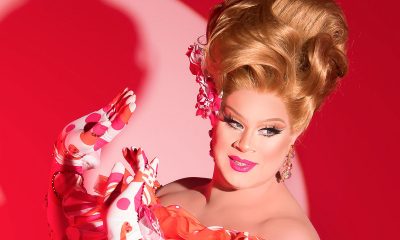
 Celebrity News5 days ago
Celebrity News5 days agoNina West’s ‘Sugar in the Tank’ tour comes to Rehoboth Beach



